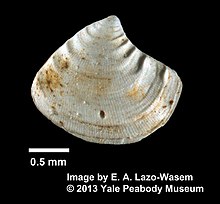
The Atlantic Ocean is the second-largest of the world's oceans, with an area of about 106,460,000 square kilometers. It covers approximately 20 percent of Earth's surface and about 29 percent of its water surface area. It separates the "Old World" from the "New World".

The Atlantic slave trade, transatlantic slave trade, or Euro-American slave trade involved the transportation by slave traders of enslaved African people, mainly to the Americas. The slave trade regularly used the triangular trade route and its Middle Passage, and existed from the 16th to the 19th centuries. The vast majority of those who were enslaved and transported in the transatlantic slave trade were people from Central and West Africa, who had been sold by other West Africans, or by half-European 'merchant princes' to Western European slave traders, who brought them to the Americas. Except for the Portuguese, European slave traders generally did not participate in the raids because life expectancy for Europeans in sub-Saharan Africa was less than one year during the period of the slave trade. The South Atlantic and Caribbean economies were particularly dependent on labour for the production of sugarcane and other commodities. This was viewed as crucial by those Western European states which, in the late 17th and 18th centuries, were vying with each other to create overseas empires.
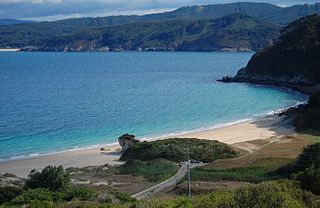
The Bay of Biscay is a gulf of the northeast Atlantic Ocean located south of the Celtic Sea. It lies along the western coast of France from Point Penmarc'h to the Spanish border, and the northern coast of Spain west to Cape Ortegal.
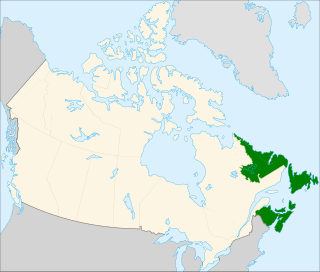
Atlantic Canada, also called the Atlantic provinces, is the region of Canada comprising the four provinces located on the Atlantic coast, excluding Quebec: the three provinces of The Maritimes – New Brunswick, Nova Scotia, and Prince Edward Island – and the easternmost province of Newfoundland and Labrador. The population of the four Atlantic provinces in 2016 was about 2,300,000 on half a million km2. The provinces combined had an approximate GDP of $121.888 billion in 2011.

The East Coast of the United States, also known as the Eastern Seaboard, the Atlantic Coast, and the Atlantic Seaboard, is the coastline along which the Eastern United States meets the North Atlantic Ocean. Regionally, the term refers to the coastal states and area east of the Appalachian Mountains that have shoreline on the Atlantic Ocean, from north to south, Maine, New Hampshire, Massachusetts, Rhode Island, Connecticut, New York, New Jersey, Delaware, Maryland, Virginia, North Carolina, South Carolina, Georgia, and Florida.

A subtropical cyclone is a weather system that has some characteristics of a tropical and an extratropical cyclone.

The Intracoastal Waterway (ICW) is a 3,000-mile (4,800 km) inland waterway along the Atlantic and Gulf of Mexico coasts of the United States, running from Boston, Massachusetts, southward along the Atlantic Seaboard and around the southern tip of Florida, then following the Gulf Coast to Brownsville, Texas. Some sections of the waterway consist of natural inlets, saltwater rivers, bays, and sounds, while others are artificial canals. It provides a navigable route along its length without many of the hazards of travel on the open sea.

The Atlantic Coast Line Railroad is a former U. S. Class I railroad from 1900 until 1967, when it merged with long-time rival Seaboard Air Line Railroad to form the Seaboard Coast Line Railroad. Much of the original ACL network has been part of CSX Transportation since 1986.

The Slave Coast is a historical name formerly used for that part of coastal West Africa along the Bight of Benin that is located between the Volta River and the Lagos Lagoon. The name is derived from the region's history as a major source of Africans that were taken into slavery during the Atlantic slave trade from the early 16th century to the late 19th century. Other nearby coastal regions historically known by their prime colonial export are the Gold Coast, the Ivory Coast, and the Pepper Coast.
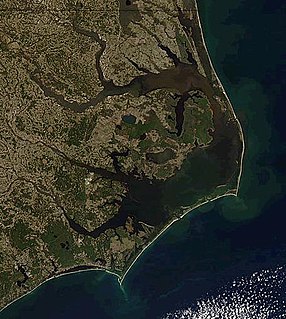
The Outer Banks are a 200-mile-long (320 km) string of barrier islands and spits off the coast of North Carolina and southeastern Virginia, on the east coast of the United States. They cover most of the North Carolina coastline, separating Currituck Sound, Albemarle Sound, and Pamlico Sound from the Atlantic Ocean.

An Atlantic hurricane or tropical storm is a tropical cyclone that forms in the Atlantic Ocean, usually between the months of June and November. A hurricane differs from a cyclone or typhoon only on the basis of location. A hurricane is a storm that occurs in the Atlantic Ocean and northeastern Pacific Ocean, a typhoon occurs in the northwestern Pacific Ocean, and a cyclone occurs in the south Pacific or Indian Ocean.

In North Carolina, the Crystal Coast is an 85-mile stretch of coastline that extends from the Cape Lookout National Seashore, which includes 56 miles of protected beaches, southwestward to the New River. The Crystal Coast is a popular area with tourists and second-home owners in the summer.

The Wake Forest Demon Deacons football team represents Wake Forest University in the sport of American football. The Demon Deacons compete in the Football Bowl Subdivision (FBS) of the National Collegiate Athletic Association (NCAA) and the Atlantic Division of the Atlantic Coast Conference (ACC). Wake Forest plays its home football games at Truist Field at Wake Forest and is currently coached by Dave Clawson.
The ACC Men's Basketball Tournament is the conference championship tournament in basketball for the Atlantic Coast Conference (ACC). Except for 2020, when it was cancelled due to the COVID-19 pandemic, the tournament has been held every year since 1954, the ACC's first season. It is a single-elimination tournament and seeding is based on regular season records. The winner, declared conference champion, receives the conference's automatic bid to the NCAA men's basketball tournament.

Slavery has historically been widespread in Africa, and still continues today in some African countries.
Crassatellidae is a family of small saltwater clams, marine bivalve molluscs of the order Carditida.
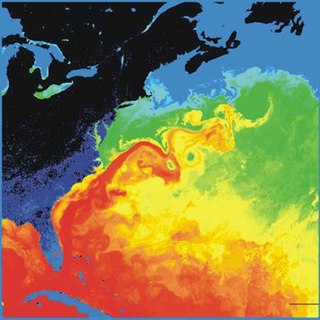
The Gulf Stream, together with its northern extension the North Atlantic Drift, is a warm and swift Atlantic ocean current that originates in the Gulf of Mexico and stretches to the tip of Florida, and follows the eastern coastlines of the United States and Newfoundland before crossing the Atlantic Ocean as the North Atlantic Current. The process of western intensification causes the Gulf Stream to be a northwards accelerating current off the east coast of North America. At about 40°0′N30°0′W, it splits in two, with the northern stream, the North Atlantic Drift, crossing to Northern Europe and the southern stream, the Canary Current, recirculating off West Africa.

Cody R. Simpson is an Australian singer, songwriter, dancer, actor and model.
